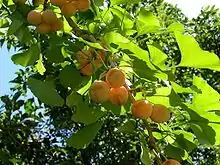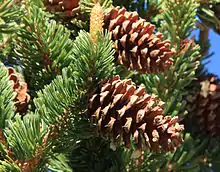phanerogam
English

Fruit of Ginkgo biloba

Cones of Pinus longaeva

Flowers of Gentiana cruciata
Etymology
From Ancient Greek φανερός (phanerós, “visible”) + γαμέω (gaméō, “to marry”); compare cryptogam.
Noun
phanerogam (plural phanerogams)
- (botany) Any plant that produces seeds (rather than spores).
- 1977, Francesco D'Amato, Nuclear Cytology in Relation to Development, page 8:
- Among phanerogams (seed plants), only two orders of gymnosperms, the Cycadales and the Ginkgoales, have ciliated motile sperm cells; all others (higher gymnosperms and angiosperms) have nonmotile sperm cells or sperm nuclei.
- 2003, Burkhard Frenzel, History of Flora and Vegetation During the Quaternary, Karl Esser, Ulrich Lüttge, Wolfram Beyschlag, Jin Murata (editors), Progress in Botany, Volume 65, page 591,
- The stomach contents of the Selerikanka horse contained 116 taxa: 96 phanerogams, 20 cryptogams. Among the phanerogams were 12 tree species, 14 species of shrubs and dwarf-shrubs, as well as 72 species of herbs and very small dwarf-shrubs.
- 2005, Mark Nuttall, Encyclopedia of the Arctic, unnumbered page:
- Generally speaking, the ranges of most cryptogams are geographically broader than those of phanerogams, and many more species are widely disjunct over the world.
-
Synonyms
- (plant that produces seeds): spermatophyte
Coordinate terms
Related terms
Translations
plant that produces seeds
|
See also
Anagrams
This article is issued from Wiktionary. The text is licensed under Creative Commons - Attribution - Sharealike. Additional terms may apply for the media files.